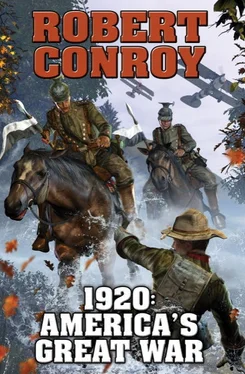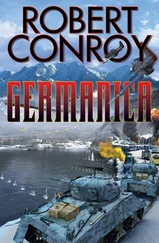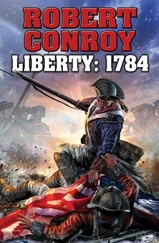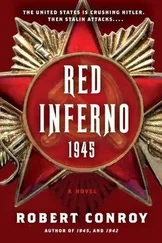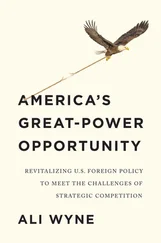The German Navy had paid a heavy price, but they were in San Francisco Bay. The city’s waterfront was burning. Could surrender be far behind? If the army had accomplished half what it had intended to do, the Americans would come crawling as they realized that their position in San Francisco was utterly untenable.
Better, the future of the German Navy would be golden.
* * *
Josh Cornell and the rest of the joint Army-Navy headquarters staff could only stare helplessly as the German warships bulled their way through the channel and into San Francisco Bay.
So much for our well-laid plans, he thought bitterly. All the digging of fortifications and the dragging of guns through the city had been for naught. The German warships had pounded the American works to dust. Yes, they had badly damaged, perhaps sunk, at least two of the enemy ships, and others had been hurt to varying degrees, but the remainder were now safely ensconced in the bay.
“Will we surrender?”
The question came from a Hearst reporter who had managed to attach himself to the group. Both Liggett and Sims glared at him. “Hell no,” Sims said. “I have not yet begun to fight.”
Liggett shook his head sadly, “Not very original but my sentiments exactly.” He spotted Cornell. “Is Firefly ready to commence?”
Josh looked at the sky. It was cloudy and gloomy. Twilight would arrive fairly soon. “In a short while, sir.”
A very young Army private ran up. He was filthy and out of breath. He looked at both Sims and Liggett in confusion. He’d doubtless never seen an admiral or a general and now he had both to contend with.
“Report to me, son,” Liggett said gently.
The private took a deep breath. “General Bullard’s respects, sir, but the Krauts have broken through and are only a couple of miles away.”
* * *
Joe Flower and Tomas Montoya had taken the freed American prisoners under their wing. They now had another hundred and fifty mouths to feed and shelter. Fortunately, the Germans had squirreled away enough foodstuffs to solve that problem for the foreseeable future. The Germans had also left enough clothing to cover the raggedy prisoners although a few grumbled at having to wear portions of German uniforms. When asked if they preferred going naked, they stopped complaining, although they took steps to ensure they didn’t look too much like German soldiers.
They had rifles and ammunition enough, again thanks to the German stockpiles, but what they didn’t have was real numbers or a destination. With potentially angry Mexicans to the south and definitely angry Germans to the north, there was no safe place to go. The decision was made to stay put and hope for a rescue, while evading German patrols.
That the Germans were interested in what was going on in Raleigh was obvious. Small patrols from San Diego scouted the area routinely, but were kept away with only minor skirmishing. Dubbins had been killed in one such fight. Nobody mourned him. Without vengeance as a motive, he’d taken to stealing things from the other Americans.
No major German force had yet shown up, but they felt it was only a matter of time. To forestall this, they had taken to the hills. It meant sleeping in tents or out of doors, but it might ensure safety. Captain Barnes and his men moved about a mile away and out of sight.
Flower and Montoya had chosen what they felt was a good defensive position facing west toward German-occupied San Diego. They were on a hill and in the distance they could see the abandoned prison camp. They both were shocked and angry when they suddenly realized that a large force of mounted men had just been spotted approaching from the east. Although too distant to make out specifics, it was clearly a military outfit, but whose? They didn’t ride in a crisp formation like the Germans. They were more like a gaggle of geese, like the Mexicans. Only, they didn’t seem to be Mexicans. At least Flower and Montoya were out of sight. With some irony, they were in the rabbit holes made by the late and unlamented Dubbins when he was spying on the camp.
“I think we’ve been outflanked, Joe.” Montoya said with dismay in his voice. Only his men and a handful of others were mounted. The freed prisoners were half-trained infantry at best, and men who had not yet regained their full physical strength. If they had to run for it, they’d be caught in a short while and slaughtered.
“Maybe,” Flower said, “And maybe not.”
“Please make sense,” Montoya snapped. Even though the two men still had feelings of ethnic enmity, they’d established a working truce. It was either that or chaos.
They were joined in the hole by Barnes. Below them, the mounted men fanned out and moved easily through the ruins of Raleigh and what had been the American’s prison. They stopped in the center of town where a naked flagpole stood. They watched intently as two men attached a flag and ran it up. The wind snapped it.
“Jesus Christ,” gasped Flower. His eyes were better and he had the binoculars.
“What?” chorused Rice and Montoya.
“It’s the stars and stripes. They’re ours.”
* * *
A few minutes later, the two groups had united with much cheering and backslapping. As the ranking officer, Tovey took charge and the others were happy to let him do it. He quickly sent a patrol west to make sure nothing was coming from that direction. As he did, a thought was forming.
Barnes again pumped his hand. “I gotta ask, General, how did you know we were here?”
“Thank her,” he said, pointing to where Martina Flores sat on her horse. She took off her wide brimmed hat and waved shyly.
“Holy hell,” yelled Barnes, “Tina came back. Now’s she’s saved us twice!”
With that, dozens of cheering former prisoners surrounded Martina and lifted her off her equally startled horse. Sitting her on Barnes’ shoulders, they began parading her around while chanting “Tee-nah! Tee-nah!”
At first confused, she broke into a wide smile and then happily waved her arms as tears began to stream down her cheeks. Tovey watched in satisfaction as more of her tormented past was purged. After a few moments they put her on the ground where she hugged and kissed a number of them, especially a young man named Sullivan who, Tovey was told, had been her contact with the prisoners.
Finally, she stood beside Tovey and discreetly took his hand, establishing ground rules that very much pleased Tovey.
“Gentlemen and lady,” Tovey announced. “I have it on good authority that a full U.S. division is about a half day behind us under a nasty Marine general named Lejeune, and that other units are right on his tail. He has wiped out some Krauts who were delaying him and now is riding the rails and making good speed. Therefore, I have a proposal. How many of you want to stay here and wait for him?”
“What’s your other choice?” asked Montoya.
“Simple. I don’t think there’s much of anything between us and San Diego but hills. You men can do as you see fit, but I’ve always wanted to see San Diego.”
* * *
Tim Randall was part of a confused mass of armed humanity trying to push and shove its way onto ferries. “Tickets, please,” someone yelled in a mock falsetto and the response was a chorus of obscenities.
Tim, Lieutenant Taylor, and the rest of the company were in the bow of the large, stubby ship. It had been designed to carry railroad cars, not men, and it had no accommodations for them. This was a mixed blessing as they were exposed to the weather, which was calm and clear for the moment, but did give them a view of what they were about to do. The lack of cover also meant that any German plane could see what they were up to and possibly strafe them. Tim hoped that all the German planes were occupied supporting their army.
Читать дальше
